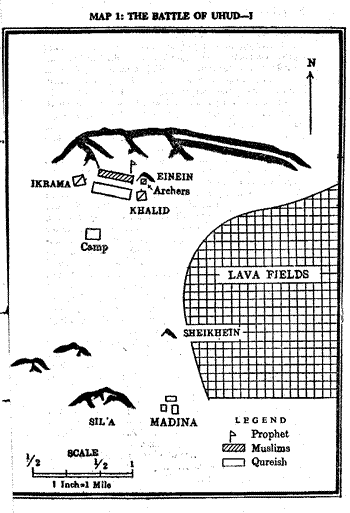|
It was the morning of Saturday,
March 22, 625 (the 7th of Shawwal, 3 Hijri)-exactly a year and a
week after Badr. 1 The armies faced each
other in orderly ranks, 700 Muslims against 3,000 unbelievers. This
was the first time that Abu Sufyan had commanded in the field against
the Prophet, but he had able lieutenants and felt certain of victory.
The Muslims repeated to themselves the Quranic words: "Sufficient
for us is Allah, and what a good protector He is." [Quran 3:
173] And they awaited the decision of Allah.
The first event, after the forming up of
the two armies, was the attempt by the Knave to subvert the Aws.
This man stepped forward ahead of the front rank of the Quraish,
along with his 50 followers and a large number of the slaves of
the Quraish. He faced the Aws and called, "O people of the
Aws! I am Abu Amir. You know me!" The reply from the Aws
was unanimous: "No welcome to you, O Knave!" This
was followed by a shower of stones hurled with great delight by
the Aws at the Knave and his group, under which the group hastily
withdrew through the ranks of the Quraish. Observing the look of
derision on the faces of the Quraish, the Knave assumed a prophetic
posture and observed, "After me my people will suffer."
2 But the Quraish were not impressed!

After the encounter of the Knave, the archers
opened up from both sides. This was a kind of artillery duel between
the 100 archers of the Quraish and the Muslim archers, who were
either in the group on Eniein or dispersed along the front rank
of the Muslims. Many salvoes were fired. Under cover of the Quraish
archers Khalid advanced with his squadron to attack the left wing
of the Muslims, but was forced back by accurate fire from the Muslim
archers. As the archers' engagement ended, the song of the Quraish
women was again heard on the battlefield: "We are the daughters
of the night... "
The next phase was the phase of duels by
the champions of the two armies. Talha, the standard bearer of the
Quraish, stepped out of the front rank and called "I am
Talha, son of Abu Talha. Will anyone duel?" 3
On his challenge, Ali strode out and before Talha could deliver
a single blow, Ali struck him with his sword and felled him. Talha
was only wounded, and as Ali raised his sword to strike again, Talha
begged for mercy. Ali promptly turned away. Later, however, while
the general engagement was in progress, the wounded Talha was despatched
by the Muslims. On the fall of Talha, another infidel came forward
and picked up the Quraish standard. This man was killed by Hamza,
As Hamza killed him, he was noticed by the Savage who stood behind
the Quraish ranks. Stealthily the Savage began to move towards the
right in order to approach Hamza from a flank. Hamza was easily
recognisable by a large ostrich feather which he wore in his turban.
Now the duels became more general. One after
the other the relatives of Talha picked up the standard, and one
after the other they were killed by the Muslims, the largest number
falling before Ali's sword, Abu Sufyan also rode up to duel and
was faced by Handhalah bin Abu Amir, who was dismounted. Before
Abu Sufyan could use his lance or draw his sword, Handhalah struck
at the forelegs of the horse and brought it down. Abu Sufyan shouted
for help and was assisted by one of his companions, who engaged
and killed Handhalah. Abu Sufyan withdrew hastily to the safety
of the Quraish ranks.
Another Quraish warrior who came forward
was Abdur-Rahman, son of Abu Bakr. He stepped out of the front rank
and gave the usual challenge, whereupon his father, Abu Bakr, drew
his sword and prepared to move forward from the Muslim position
to fight him. But Abu Bakr was restrained by the Holy Prophet, who
said to him, "Sheathe your sword," 4
This Abdur-Rahman was later to become one of the most valiant warriors
of Islam and acquire glory in the Muslim campaigns in Syria.
1. Some historians have placed the date
of the Battle of Uhud a week later, but the earlier date is probably
more correct.
2. Ibn Hisham:
Vol. 2, p. 67; Ibn Sad: p. 543.
3. Waqidi:
Maghazi, p. 176.
4. Ibid:
p. 200.
|
